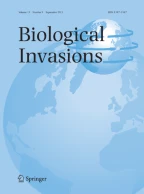Abstract
Among other factors, globalization has promoted the spread of alien organisms, posing a great risk to Earth’s biodiversity. Land planarians of the family Geoplanidae especially benefit from human-mediated transport. Many species become established in new areas, where they represent threats to the native soil fauna. Obama nungara is a species described from Brazil, but with many well-established populations in Europe. In this study, specimens from Argentina, Brazil, Portugal and Spain were morphologically and molecularly studied to establish the potential origin of the invasive events within the Iberian Peninsula. Analyses of the mitochondrial lineages (haplotype networks) of these populations revealed previously unknown relationships and biogeographical patterns that suggest an Argentine origin for the Iberian populations. Furthermore, comparative analysis of Argentine, Iberian and Brazilian populations revealed three well-defined and distinct O. nungara clades. Our findings suggest two independent introductions of different populations from Argentina that gave rise to the different Iberian populations. This population diversity suggests hidden biodiversity of alien land planarians in invaded areas and their invasive and adaptive potential.
Similar content being viewed by others
References
Álvarez-Presas M, Amaral S, Carbayo F, Leal-Zanchet AM, Riutort M (2015) Focus on the details: morphological evidence supports new cryptic land flatworm (Platyhelminthes) species revealed with molecules. Org Divers Evol 15:379–403
Bessho Y, Ohama T, Osawa S (1992) Planarian mitochondria I. Heterogeneity of cytochrome c oxidase subunit I gene sequences in the freshwater planarian, Dugesia japonica. J Mol Evol 34:324–330
Boll PK, Leal-Zanchet AM (2016) Preference for different prey allows the coexistence of several land planarians in areas of the Atlantic Forest. Zoology 119(3):162–168
Carbayo F, Álvarez-Presas M, Jones H, Riutort M (2016) The true identity of Obama (Platyhelminthes: Geoplanidae) flatworm spreading across Europe. Zool J Linn Soc 177:5–28
Clement M, Posada D, Crandall KA (2000) TCS: a computer program to estimate gene genealogies. Mol Ecol 9:1657–1660
Darriba D, Taboada GL, Doallo R, Posada D (2012) jModelTest 2: more models, new heuristics and parallel computing. Nat Methods 9:772
Ducey PK, West L-J, Shaw G, De Lisle J (2005) Reproductive ecology and evolution in the invasive terrestrial planarian Bipalium adventitium across North America. Pedobiologia 49:67–377
Froehlich CG (1959) On Geoplanids from Brazil. Bol Fac Fil Cie Let Univ S Paulo, Ser Zool 22:201–242
Fujisawa T, Barraclough TG (2013) Delimiting Species Using Single-locus Data and the Generalized Mixed Yule Coalescent (GMYC) Approach: a Revised Method and Evaluation on Simulated Datasets. Syst Biol 62:707–724. https://doi.org/10.1093/sysbio/syt033
Invasive Species Specialist Group ISSG (2015) The Global Invasive Species Database. Version 2015.1. http://www.iucngisd.org/gisd/. Downloaded on May 31 2018
Justine J, Winsor L, Barrière P, Fanai C, Gey D, Han AWK, La Quay-Velázquez G, Lee BPY, Lefevre J, Meyer J, Philippart D, Robinson DG, Thévenot J, Tsatsia F (2015) The invasive land planarian Platydemus manokwari (Platyhelminthes, Geoplanidae): records from six new localities, including the first in the USA. PeerJ 3:e1037
Justine J, Winsor L, Gey D, Gros P, Thévenot J (2018) Giant worms chez moi! Hammerhead flatworms (Platyhelminthes, Geoplanidae, Bipalium spp., Diversibipalium spp.) in metropolitan France and overseas French territories. PeerJ 6:e4672
Kaluza P, Kölzsch A, Gastner MT, Blasius M (2010) The complex network of global cargo ship movements. J R Soc Interface 7:1093–1103. https://doi.org/10.1098/rsif.2009.0495
Katoh K, Standley DM (2013) MAFFT multiple sequence alignment software version 7: improvements in performance and usability (outlines version 7). Mol Biol Evol 30:772–780
Kraepelin K (1901) Über die durch den Schiffsverkehr in Hamburg eigeschleppten Tiere. Mitt naturh Mus Hamb 18:183–209
Lago-Barcia D, Fernández-Álvarez FA, Negrete L, Brusa F, Damborenea C, Grande C, Noreña C (2015) Morphology and DNA barcodes reveal the presence of the non-native land planarian Obama marmorata (Platyhelminthes: Geoplanidae) in Europe. Invertebr Syst 29:12–22
Lanfear R, Calcott B, Ho SY, Guindon S (2012) Partitionfinder: combined selection of partitioning schemes and substitution models for phylogenetic analyses. Mol Biol Evol 29:1695–1701
Mateos E, Tudó A, Álvarez-Presas M, Riutort M (2013) Planàries terrestres exòtiques a la Garrotxa. Annals de la delegació de la Garrotxa de la ICHN 6:67–73
Murchie AK, Gordon AW (2013) The impact of the “New Zealand flatworm”, Arthurdendyus triangulatus, on earthworm populations in the field. Biol Invasions 15:569–586
Sambrook J, Fritsch E, Maniatis T (1989) Molecular cloning: a laboratory manual. Cold Spring Harbor Laboratory, New York
Trifinopoulos J, Nguyen LT, von Haeseler A, Minh BQ (2016) W-IQ-TREE: a fast online phylogenetic tool for maximum likelihood analysis. Nucleic Acids Res 44:232–235
Vila-Farré M, Sluys R, Mateos E, Jones HD, Romero R (2011) Land planarians (Platyhelminthes: Tricladida: Geoplanidae) from the Iberian Peninsula: new records and description of two new species, with a discussion on ecology. J Nat Hist 45:869–891. https://doi.org/10.1080/00222933.2010.536267
Wilcove DS, Rothstein D, Dubow J, Phillips A, Losos E (1998) Quantifying threats to imperilled species in the United States. Bioscience 48:607–615
Zhang J, Kapli P, Pavlidis P, Stamatakis A (2013) A general species delimitation method with applications to phylogenetic placements. Bioinformatics 29:869–2876
Acknowledgements
This work was supported by the Museo Nacional de Ciencias Naturales (CSIC), funded by project CGL2011-29916 (Spanish Ministry of Economy, Industry and Competitiveness). LN, FB and CD are financed by Project N11/728 and N11/886 (FCNyM-UNLP), PIP 11220120100635CO (CONICET) and PICT 2014-0768 (ANPCyT). The authors are deeply indebted to Lourdes Alcaraz for their help and assistance in obtaining Obama’s original genetic sequences. We are grateful to the staff of the greenhouses that collaborated with us.
Author information
Authors and Affiliations
Corresponding author
Rights and permissions
About this article
Cite this article
Lago-Barcia, D., Fernández-Álvarez, F.Á., Brusa, F. et al. Reconstructing routes of invasion of Obama nungara (Platyhelminthes: Tricladida) in the Iberian Peninsula. Biol Invasions 21, 289–302 (2019). https://doi.org/10.1007/s10530-018-1834-9
Received:
Accepted:
Published:
Issue Date:
DOI: https://doi.org/10.1007/s10530-018-1834-9
